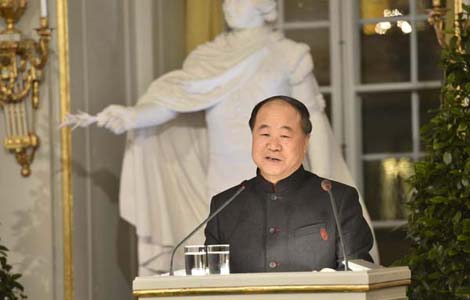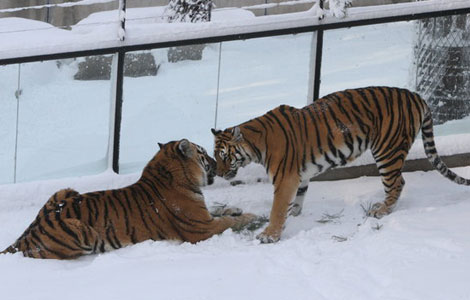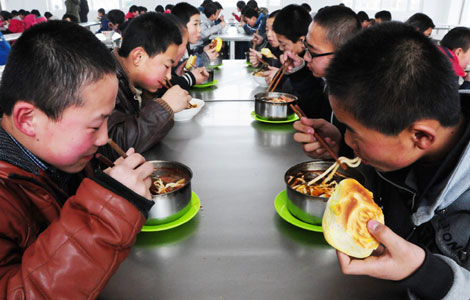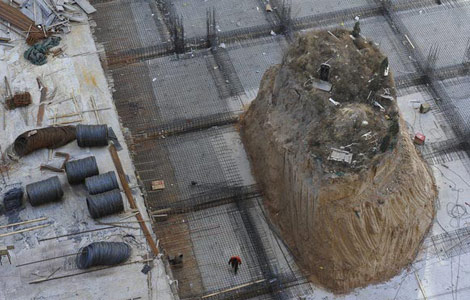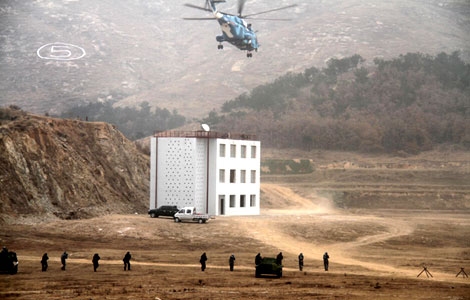
For Wang Ye, a 33-year-old housewife in Beijing, it's difficult to understand how a simple toy truck can distract her 15-month-old son for hours at a time.
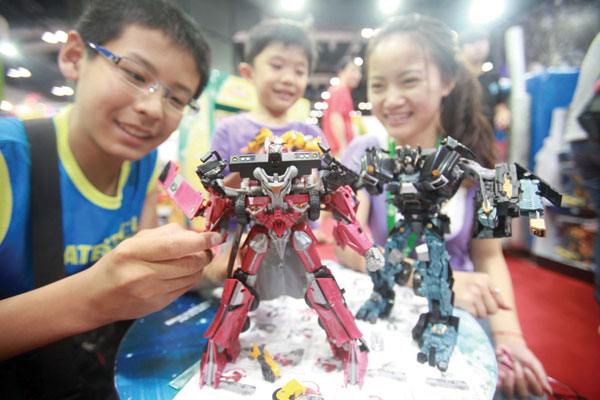 |
|
Children play with Transformers at a toy exhibition in Beijing. Chinese toy market is expected to double to 60 billion yuan($9.63 billion) by 2015 from 2010. Chen Xiaogen/For China Daily |
Wang, who said she had more experience with books than with toys as a child, takes her son to the Joy City Shopping Mall in the capital's Xidan neighborhood about three times a week. She said her son is able to sit in a toy store for more than an hour without wanting his mother.
That worries her. What if he becomes addicted to toys? What if he keeps asking for more and more toy trucks?
"The daughter of my cousin is about 4 years old now, and no matter how many toys her mother buys, she still asks for new ones," Wang said.
Wang is among China's latest generation of new parents in their late 20s and early 30s who are stuck in a parental conundrum. Many of their own parents preached education over playtime, and hard work over leisure.
But after three decades under the one-child policy in China and rapid economic growth, in which more affluent families are focusing all their attention on their babies— and with new parents often believing the easiest way to take care of their elderly parents is by living with them — there are plenty of adults looking after and spending on the only child in the apartment. The opportunities for the toy industry are obviously plentiful.
"Nowadays, kids are very lucky to have so many fancy places to be and so many options to play with," Wang said.
But in order to get more parents and grandparents to frequent toy stores, companies are hoping that recreation is seen as a more important part of child rearing. So what should a toy company in China do to be more successful, especially in a country where the average annual spending on toys per child, rural or urban, in China is less than 30 yuan ($4.80). The figure ranks far behind the Asian average of $13 per year.
Fortunately, there are more than 400 million Chinese children aged 14 or younger. China also manufactures more than 70 percent of the toys in the world, and its toy market is expected to double to 60 billion yuan by 2015 from 2010, according to the China Toy and Juvenile Product Association.
One resource that companies can use to find clues as to what strategy reaps success in China's toy industry is the shopping mall, according to industry experts. Many major toy companies, such as Walt Disney Co, Lego, Toys "R" Us, and Mattel Inc, have expanded their sales coverage in China within the past three years.
At the Joy City Shopping Mall in Beijing which Wang frequents, there are around 20 stores catering to children, including a 1,300-square-meter Toys "R" Us.
Stores for children, experts say, are highly welcomed by commercial real estate companies in China. In a shopping mall, these toy stores can attract more customers and at the same time enhance the mall's retail, dining and entertainment sales figures, according to Joy City Shopping Mall representatives.
"Opening up in shopping malls is definitely the strategy that Toys "R" Us is adopting in China. Chinese consumers prefer places where there is a lot of entertainment, which is different from most of our traditional markets," said Mark Murphy, country manager for Toys "R" Us China. "We try to make our stores more enjoyable to be in."
The Joy City Shopping Mall store is the company's model for further expansion in northern China in terms of size, layout and location, Murphy said.
Jerry Storch, chairman and CEO of Toys "R" Us, which is based in New Jersey, said at the opening of the company's Beijing store in August, "international expansion is a key part of our overall strategy, and we are committed to further growth and investment in our business in China".
"Our expansion into Beijing is an important next step as we aggressively extend the Toys "R" Us brand throughout Asia."
In August, two Toys "R" Us stores, including the one at Joy City Shopping Mall, opened in Beijing. The world's leading retailer of toy and baby products plans to open around 30 stores across 21 cities in China. It also launched its own online shopping site in China last month in a bid to tap into the country's fast-expanding middle-income group.
To appeal to China's education-minded parents, Toy "R" Us is also introducing more educational toys, such as microscopes. It has also designed toys specifically for Chinese kids, such as a doll in the likeness of Balala the Fairy for girls and Battle Action Role-Play for boys.
"We hope to put in more local Chinese characters that kids in China know very well," said Murphy, who added that there will be a wider assortment of educational toys in the future.
It's unlikely that every overseas toy company will have the clout or the expertise of a major retailer such as Toys "R" Us, but experts say in China's emerging market, there is still time to adjust strategies.
Mattel, based in California, spent millions of dollars to open a six-story flagship store in Shanghai in 2009, but closed it last year. The Barbie maker did not provide a reason for the closure.
"They didn't think long and hard enough about whether Chinese girls wanted to look sexy or they wanted to look something closer to what you'd associate with Japan — cute. So Hello Kitty is doing well, but Barbie is an example of crash and burn," said Karl Gerth, author of As China Goes, So Goes the World: How Chinese Consumers Are Transforming Everything.
Mattel is now expanding its distribution network into smaller Chinese cities, Jean-Christophe Pean, Asia-Pacific general manager of Mattel, said earlier.
And experts say that as China shifts from being a major toy maker to a toy consumer, the nation welcomes and needs these products from foreign companies. In order to expand their market share, Chinese experts suggest that international brands should actively promote the culture of play.
Liang Mei, executive vice-president of the China Toy and Juvenile Products Association, said the big problem with the market is that consumers, especially young parents, really do not understand the culture of toys.
"Most Chinese parents still regard toys as a reward to their kids, instead of a necessity of their daily life. But you know, to play is the nature of kids," she said.
Liang added that with China's population, it won't be too difficult for international brands to reach a sales volume as big as their traditional markets.
"According to the survey on toy consumption which the association conducts every year, major brands are not the most popular products, and international toy companies still have very limited influence in China, mainly in major cities," she said.
Liang suggested that international companies should cooperate more with local retailers to help them create a bigger network in China.
"The most important thing is to have consumers, especially those parents who understand the importance of toys in their children's lives. We need to arrange the events to have them and their parents playing together," she said.
Wang, the Beijing housewife, is beginning to realize that toys could be vital for her son's upbringing.
"Different from the stores in my childhood, where all the products were put on shelves, most stores today create play areas," she said.
"It seems that those toys are able to help my son develop his independence and interests on his own."
